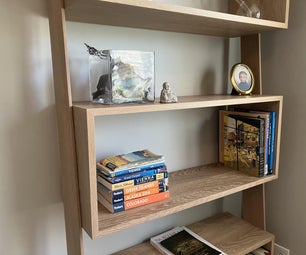Introduction: Industrial Freestanding Coat Rack
This is a project that will produce an industrial-chic freestanding coat rack using all the tools and materials you can find at a worksite!
Imagine you are stuck with a bunch of construction supplies and you suddenly need to whip up a project.....
Step 1: Our Saga Begins....
CrazyClever finds herself ready to begin a day of work remodeling a house until....
*bing bing*
A text from a good friend. This particular friend has been patiently waiting for one of CrazyClever's fun and whimsical projects for a housewarming gift.
Time to get creative and see what CrazyClever can make with the materials at hand- she's only got a few hours until her friend gets home!
After looking around at what we have at our disposal......
How about....a coat rack!?
Step 2: Our Hero Gathers Her Supplies....
Ok, lets see....
Traffic cone.
2x2.
concrete.
A handful of giant hex keys that would *totally* be at every worksite.....
...and duct tape!
Perfect, that should be plenty to create a simple, yet elegant, coat rack!
Step 3: Start With Prepping the 2x2
Let's get that 2x2 cut to size and the holes drilled out for the hex key posts!
CrazyClever knows her friend has low ceilings so she cut it to a nice 64". That will be plenty of height to hold hats, jackets, and work aprons.
After the board is cut down we'll need to drill out holes for the posts.
We have two different sizes of hex wrenches at our disposal: 10mm and 8mm.
The 8mm wrenches will be at the top, about 2" down.
The 10mm wrenches will be about 5" down from the top.
The drill bits came with a handy conversion chart and you can use to match the closest sized drill bit to the size of the hex wrench.
10mm=13/32drill bit
8mm= 21/64 drill bit.
The holes will seem undersized but that's okay! They will be just right for hammering the corners of the hex wrenches in to get a tight fit without splitting the wood.
How many hooks are wanted? It's easy to fit two hex wrenches to each hole- just hammer them in from opposite sides! It looks nicer if the hooks aren't all facing the same way, so alternate which side of the wood is drilled.
CrazyClever measures,cuts, drills and is ready to prep the traffic cone.....
Step 4: Lets Prep That Traffic Cone!
The top of an 18" tall traffic cone is just barely too small to fit the 2x2. Really, its a case of fitting a square peg in a round hole. Grab an utility blade and cut 4 lines to create a "square" opening.
Great! Now that 2x2 fits perfectly.
There also happens to be a giant hole at the bottom we need to take care of since we intend on filling the cone with concrete.
CrazyClever tears pieces of duct tape, one after another, overlapping them over the opening in both a secure and an artistic manner. Let's see what she needs to do next to pull this project off....
Step 5: Always Support the Bottom of Your Cone...
Oh no! the bottom of the cone has raised nubbins! If we don't support the hole and support the duct tape the concrete will sag down and bust through! CrazyClever grabs some drywall scrap she has on hand and gets to building up a support.
After measuring the largest distance she can get between the nubbins to create a template. Making a circle is awful with drywall, so with straight lines in mind, she hacks out an octagon shape. This works perfectly as the corners offer extra support between the nubbins! Good problem solving CrazyClever!
The support needs two layers of drywall to meet and exceed the height of the nubbins. Exceeding the height is fine, we only need to support the hole and eliminate any sag.
The support is taped into place and is ready for concrete....
Step 6: CrazyClever Takes a Break and Decides to Get Crafty....
Time for a well deserved break, tuck back into a luke warm Mountian Dew to pick your spirits back up. You've been working that brain on overtime and it needs fuel!
CrazyClever decides she can use the dew to her advantage. Maybe, just maybe, it could act as a handy funnel to help pour the concrete into the cone....
All prepped and ready to mix and pour concrete!
Step 7: Censored Concrete Pouring....
Despite the concrete that was available on site, CrazyClever opted for some CementAll she grabbed during her lunch break. CementAll promises to be ideal for casting with a fast cure time. The change in material gives her a peace of mind that it'll be cured and ready to unmold within an hour.
CrazyClever races against the clock as she shovels handfuls of cement into the cone. The funnel idea was a terrible failure so she resorted to the gruesome act of filling the cone a handful at a time as the cement resisted going through the tiny opening at the top. Surprisingly her tactics, while messy and stressful, worked! Quickly she shoves the 2x2 in through the top, down through the cement, and made sure it was held securely in place at the top of the cone.
Now is also a good time to check that the pole is straight and level.
All in all, about 20lbs of cement were used and filled about 2/3 of the cone. That's exactly what is wanted - the finished product shouldn't look like a traffic cone - it should be chic.
After tapping on the side of the cone to level out the cement, there is nothing left to do but wait. Good thing CrazyClever has a another Mountain Dew for another well earned break!
Step 8: Make It or Break It Time!
Now is the time to find out if everything worked according to plan!
CrazyClever pops off the bottom support to see if cement had spilled everywhere. *Tah dah!* Looks like it all held together well! The cement needs a little help to get loose as the weight bulged it out a bit at the bottom. Luckily the mold is able to be stretched, pulled, and inverted off the cement. After the cone is beyond the bulge it fell right off.
Any dried cement is easily popped off the flexible traffic cone so it can quickly be put back to its proper use.
Warning! - The cement cured with an exothermic reaction, it got super hot! That means it melted the glue of the duct tape. So maybe use a different tape?
CrazyClever took advantage of the melty glue bottom situation and cut a circle of felt and stuck it right to the bottom to the leftover glue (not shown). The felt sticks very well and will provide a scratch free bottom for any indoor use. What a way to make lemonade out of lemons!
A hammer can be used to clean up the edges if a bit of cement escaped.
To finalize our assembly, hammer in those wrenches!
Step 9: Celebrate and Relax Before Delivery.
You've done it CrazyClever! After so much problem solving, improvising, and planning.
It looks so great at the worksite, you could really use a place to put all your safety gear. Maybe you could surprise your friend with a gift card instead......
No. No. You made a promise. Deliver your goods!
Step 10: Delivered to Its Happy New Home
The industrial chic looks great in a workshop or a renovated 100 year old home.The rack was perfect for CrazyClever's friend's work aprons, it fit the low ceiling, and it had a very small footprint.
It may seem like the rack would tip over but its very sturdy and centered. If you bump into it, it wobbles right back into place with a determination to keep standing upright.
If you find yourself on a worksite and want a coat rack you can discreetly build without getting hollered at by a foreman, I recommend it.

Runner Up in the
Creative Misuse Contest













